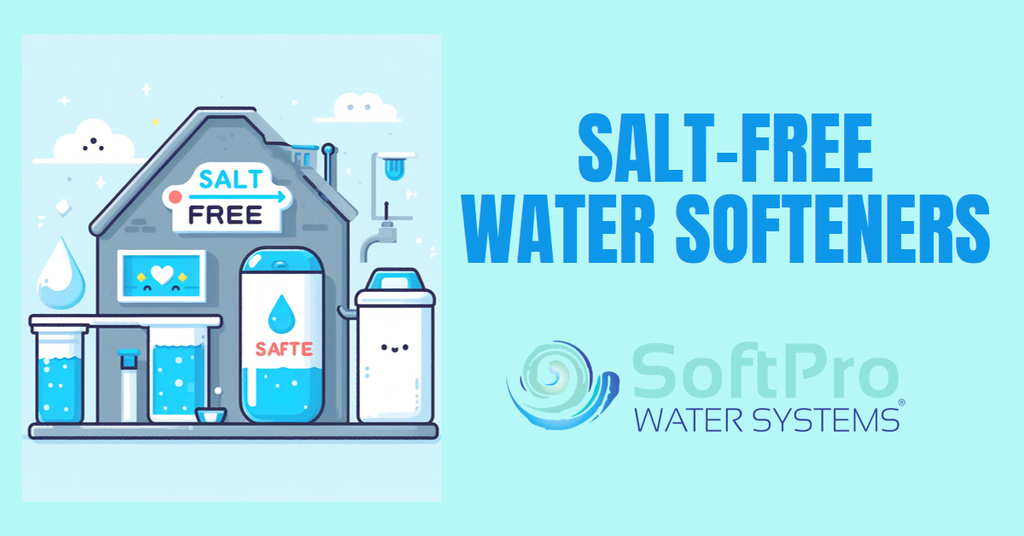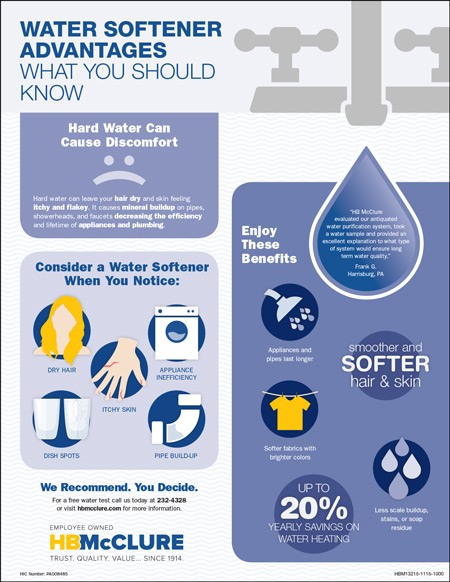Disclosure: This post contains affiliate links and I will be compensated if you make a purchase after clicking through my links. Learn More
Imagine transforming your daily life with a simple change that saves you money and improves your home environment. You might not realize it, but hard water could be quietly impacting your finances and the efficiency of your appliances.
When you invest in a water softener, you unlock a range of benefits that make it worth every penny. From cutting down on costly repairs to enhancing your household chores, the advantages are clear and compelling. Curious about how this can make a difference in your life?
Keep reading to discover how a water softener can be a game-changer for your home and wallet.

Credit: www.softprowatersystems.com
Cost Savings On Household Appliances
Investing in a water softener brings financial relief. Hard water damages appliances. Soft water extends their life, reducing repair costs. It also cuts energy bills, saving money over time.
Prolonged Appliance Lifespan
Hard water leaves mineral deposits. These deposits harm appliances like dishwashers and washing machines. With a water softener, appliances stay clean and efficient. This means fewer replacements and repairs. It saves money in the long run. Soft water helps appliances run smoothly. They last longer, keeping more money in your pocket.
Reduced Energy Consumption
Hard water makes heating systems work harder. Mineral buildup reduces efficiency. Soft water improves heat transfer. It helps water heaters work less. This lowers energy bills each month. Soft water makes soap lather better. Less soap means lower costs. Energy use drops with soft water. Bills become lighter, easing monthly expenses.
Decreased Plumbing Maintenance
Water softeners can significantly reduce plumbing maintenance. Hard water causes mineral buildup in pipes. This leads to various plumbing issues over time. By softening water, you minimize these problems. Fewer minerals mean less wear and tear on plumbing systems. This translates to less frequent repairs and replacements.
Less Pipe Damage
Softened water reduces pipe damage. Hard water deposits minerals inside pipes. These minerals cause corrosion. Corrosion weakens pipes, leading to leaks. Soft water prevents this buildup. Pipes remain strong and last longer. You save money on pipe replacements.
Fewer Clogs And Leaks
Mineral deposits cause clogs in pipes. These clogs obstruct water flow. Slow water flow leads to pressure build-up. Pressure causes leaks and bursts. Soft water minimizes mineral deposits. Pipes stay clear and function efficiently. You experience fewer clogs and leaks.
Improved Cleaning Efficiency
Have you ever noticed how hard water seems to make cleaning tasks a real chore? If you’re tired of scrubbing away stubborn soap scum and dealing with lackluster results, a water softener might be the solution you’ve been looking for. With its ability to transform hard water into soft, it enhances cleaning efficiency across the board. Let’s dive into how a water softener can make your cleaning routine more effective and less time-consuming.
Enhanced Soap And Detergent Performance
Ever wondered why your soap and detergent don’t quite cut it with hard water? It’s because minerals like calcium and magnesium reduce their effectiveness. With a water softener, these minerals are removed, allowing soaps and detergents to work at their full potential. This means you use less product and get better results. Imagine using half the amount of detergent and still getting cleaner clothes and dishes. That’s not just a time saver; it’s a money saver too.
Picture this: you load your washing machine with your favorite clothes, add detergent, and expect fresh, clean results. But hard water can leave fabrics feeling stiff and dull. Soft water changes this entirely, leaving your clothes softer and brighter. The difference is noticeable, and it makes you wonder why you hadn’t made the switch sooner.
Spot-free Dishes And Glassware
Spotty dishes can be a frustrating sight after a cycle in the dishwasher. Hard water leaves behind mineral deposits, resulting in spots and streaks. A water softener eliminates these deposits, ensuring your dishes and glassware come out sparkling clean. No more re-washing or polishing required.
Think about the last time you hosted a dinner party. You want your glassware to shine, but hard water can make them look less than perfect. With soft water, your glasses remain spot-free and ready to impress your guests. It’s a small change that makes a big difference in presentation.
Are you spending too much time and effort on cleaning tasks that should be simple? Consider the transformation a water softener can bring to your home. Improved cleaning efficiency means less time cleaning and more time enjoying the things you love. How will you use the extra time you’ll gain?

Credit: hbmcclure.com
Enhanced Personal Care Benefits
If you’re considering a water softener for your home, the promise of enhanced personal care benefits is a compelling reason to make the switch. A water softener does more than just protect your plumbing; it can significantly improve your daily life. You might be surprised by how much softer your skin feels and how your hair becomes easier to manage. Let’s delve into the specific advantages that can transform your routine.
Softer Skin And Hair
Have you ever noticed your skin feels dry and your hair is less manageable after a shower? Hard water could be the culprit. It contains minerals like calcium and magnesium, which can leave residue on your skin and hair.
With a water softener, you can say goodbye to these issues. Softened water rinses away soap more effectively, leaving your skin feeling smooth and your hair shiny and vibrant. Imagine stepping out of the shower with skin that feels like you’ve just applied moisturizer. That’s the daily luxury a water softener can provide.
Think about your current hair care routine. How much time do you spend dealing with tangles or dryness? Softened water can make a noticeable difference, allowing you to enjoy healthy, manageable hair with less effort. How would you like to cut down on expensive hair treatments or moisturizers?
Gentler On Fabrics
Hard water doesn’t just affect your skin and hair; it also takes a toll on your clothes. Those minerals can make fabrics feel rough and cause colors to fade faster. A water softener helps protect your clothes, ensuring they last longer and feel better against your skin.
Consider the savings. With softer water, your clothes come out of the wash feeling fresher and more vibrant. You might even find that you need less detergent, which is kinder to your wallet and the environment. Doesn’t it sound appealing to save money while enjoying clothes that feel like new?
Next time you do laundry, notice how your fabrics feel. Are they as soft as you want them to be? If not, a water softener could be the solution you’ve been looking for. What if every load of laundry felt like a fresh start for your clothes?
By investing in a water softener, you’re not just enhancing your home’s water quality; you’re investing in the comfort and care of your personal routine. Imagine the daily benefits and consider how they align with your lifestyle.
Environmental Benefits
Installing a water softener offers more than just cleaner dishes and softer clothes. It also brings significant environmental benefits. By reducing the minerals in your water supply, a water softener helps conserve energy and decreases the need for harsh cleaning products. These advantages not only help save money but also contribute positively to the planet.
Reduced Water Heater Energy Use
Hard water contains minerals like calcium and magnesium. These minerals build up in water heaters. Over time, this buildup makes the heater work harder. More energy gets used to heat water. A water softener prevents this buildup. It helps your heater run efficiently. Using less energy means lower electricity bills and a smaller carbon footprint.
Minimized Detergent Use
Hard water requires more soap and detergent for effective cleaning. The minerals in hard water interfere with soap’s cleaning power. This means using more detergent to wash clothes, dishes, and even your hair. With a water softener, you need less soap. It leads to fewer chemicals entering the waterways. This reduces pollution and helps protect aquatic life.
Selecting The Right Water Softener
Choosing the right water softener is crucial for your home. It ensures you receive optimal savings and benefits. The selection process can seem overwhelming. But breaking it down into key considerations can help. This section explores what you need to know. From understanding your home’s needs to the types of softeners available.
Considerations For Home Size
The size of your home matters. Larger homes need more powerful systems. A small unit won’t suffice for a big household. Consider the number of people in your home. More people mean more water usage. Check the hardness level of your water. It affects the system’s efficiency. A larger home often has more fixtures. This impacts the softener’s capacity.
Types Of Water Softeners
There are several types of water softeners. Salt-based systems are common. They use ion exchange to soften water. Salt-free systems, on the other hand, condition the water. Magnetic systems are available too. They use magnets to alter water properties. Dual-tank systems provide a continuous supply. Each type has its own benefits. Consider maintenance and cost. These factors influence your choice.
Installation And Maintenance Tips
Installing a water softener can save money on energy bills and extend the life of appliances. Regular maintenance ensures optimal performance, reducing scale buildup in pipes and improving water quality. Enjoy softer skin and cleaner dishes with this essential home upgrade.
Installing and maintaining a water softener can seem daunting, but with the right tips, you’ll find it manageable and rewarding. Having a water softener not only extends the life of your appliances but also saves you money on soap and energy bills. Let’s dive into some practical tips to ensure you get the most out of your water softener.
Professional Vs. Diy Installation
Deciding between professional and DIY installation is crucial. Hiring a professional ensures that the water softener is installed correctly and efficiently. It might cost more upfront, but you avoid potential mishaps and future repairs. On the other hand, DIY installation can save you money if you’re handy and follow the instructions carefully. You’ll also gain a better understanding of how your system works.
But consider this: are you confident in tackling potential challenges that might arise? If you choose DIY, make sure to have all the necessary tools and read the manual thoroughly. Watching a few online tutorials can also boost your confidence. Remember, the goal is a smooth and effective installation to maximize your investment.
Routine Maintenance Practices
Routine maintenance keeps your water softener running efficiently and extends its lifespan. Regularly check the salt levels and replenish as needed. This simple step ensures that your system functions properly. Cleaning the brine tank every six months is another essential practice. It prevents salt from building up and causing issues.
If you’ve ever skipped this step, you might have noticed your water softener wasn’t performing at its best. Inspect the system for leaks or unusual sounds. Addressing these early can save you from costly repairs. How often do you examine your household appliances for such signs? Lastly, consider setting a maintenance reminder on your phone or calendar. This way, you won’t forget these crucial tasks, keeping your water softener in top shape. After all, consistent care leads to long-term benefits.

Credit: freedomwatersystems.com
Final Words
A water softener offers great savings and benefits. It reduces energy bills. Appliances last longer with softened water. You use less soap and detergent. Plumbing issues decrease, saving on repairs. Skin and hair feel better without hard water. Your home stays cleaner with less effort.
Investing in a water softener is wise. It improves daily life and saves money. Cleaner dishes, softer clothes, and better showers. Consider the long-term benefits. Your wallet and home will thank you.


